Babies are a bundle of joy, but they also come with a lot of surprises, including their poop. As a parent, you may notice that your babies poop smells like vinegar. This can be concerning, but it’s usually nothing to worry about. Understanding why baby poop smells like vinegar can help you determine if there is a cause for concern.
Baby poop is a good indicator of their health and well-being. It’s important to pay attention to the color, texture, and smell of your baby’s poop. While the smell of vinegar may be alarming, it’s actually quite common and can be caused by a variety of factors. In this article, we will explore why baby poop smells like vinegar, the impact of diet on baby poop smell, and when to consult a doctor if you are concerned about your baby’s poop.
Key Takeaways
- Baby poop that smells like vinegar is usually nothing to worry about.
- Diet can play a significant role in the smell of baby poop.
- If you are concerned about your baby’s poop, it’s important to consult a doctor.
Understanding Baby Poop
Baby poop can be a cause for concern for new parents, especially if it smells like vinegar. However, it is important to understand that baby poop can vary in consistency, size, frequency, color, and appearance. In this section, we will provide a brief overview of what to expect when it comes to your baby’s poop.
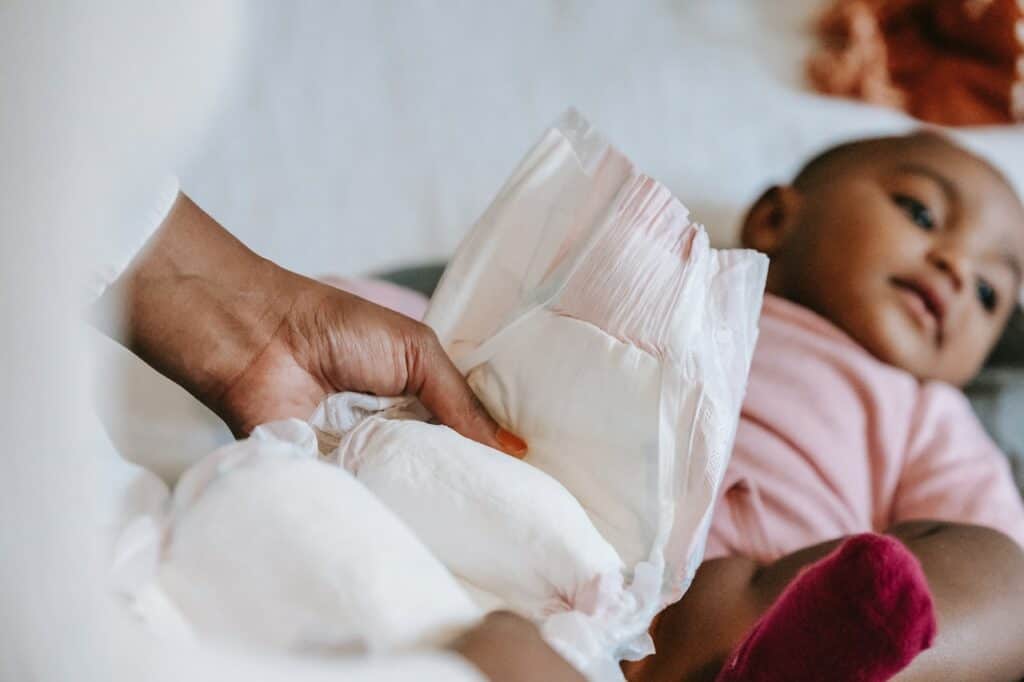
Consistency: Baby poop can range from watery to pasty, and it can also be seedy or curdled. Breastfed babies tend to have looser stools, while formula-fed babies have firmer stools.
Size: The size of a baby’s poop can vary depending on their age and diet. Newborns typically have small, frequent bowel movements, while older babies may have less frequent but larger bowel movements.
Frequency: Babies can poop anywhere from several times a day to once every few days. Breastfed babies tend to poop more frequently than formula-fed babies.
Poop Color: Baby poop can range in color from yellow to green to brown. The color can be affected by a baby’s diet, as well as by certain medications or medical conditions.
Appearance: Baby poop can have a variety of appearances, including seedy, curdled, or even mucus-like. It is important to pay attention to any changes in your baby’s poop, as this can be a sign of underlying health issues.
In conclusion, understanding your baby’s poop is an important part of caring for your little one. By paying attention to consistency, size, frequency, color, and appearance, you can ensure that your baby is healthy and thriving. If you have any concerns about your baby’s poop, be sure to speak with your pediatrician for guidance and support.
Why Baby Poop Smells Like Vinegar
It is not uncommon for new parents to notice that their baby’s poop smells like vinegar. This can be concerning, but it is usually not a cause for alarm. In most cases, the vinegar smell is caused by bacteria in the baby’s digestive tract.
Bacteria play an important role in the digestive process, breaking down food and aiding in the absorption of nutrients. However, some types of bacteria can produce strong-smelling compounds, such as acetic acid, which gives vinegar its distinctive odor.
The presence of these bacteria in a baby’s digestive tract can be influenced by a number of factors, including diet, medication, and exposure to other people or animals. For example, if a baby is breastfed, their poop may smell slightly sweet or sour, depending on the mother’s diet. On the other hand, if a baby is formula-fed, their poop may have a more pungent odor.
In some cases, a vinegar smell in baby poop may be a sign of an infection, such as a virus or parasite. However, this is relatively rare and is usually accompanied by other symptoms, such as diarrhea or vomiting.
Overall, while a vinegar smell in baby poop may be unpleasant, it is usually nothing to worry about. However, if you are concerned or notice other symptoms, it is always best to consult a healthcare professional.
Impact of Diet on Baby Poop Smell
The food that a baby consumes can have a significant impact on the smell of their poop. Here are some of the ways that different foods can affect the odor of a baby’s stool:
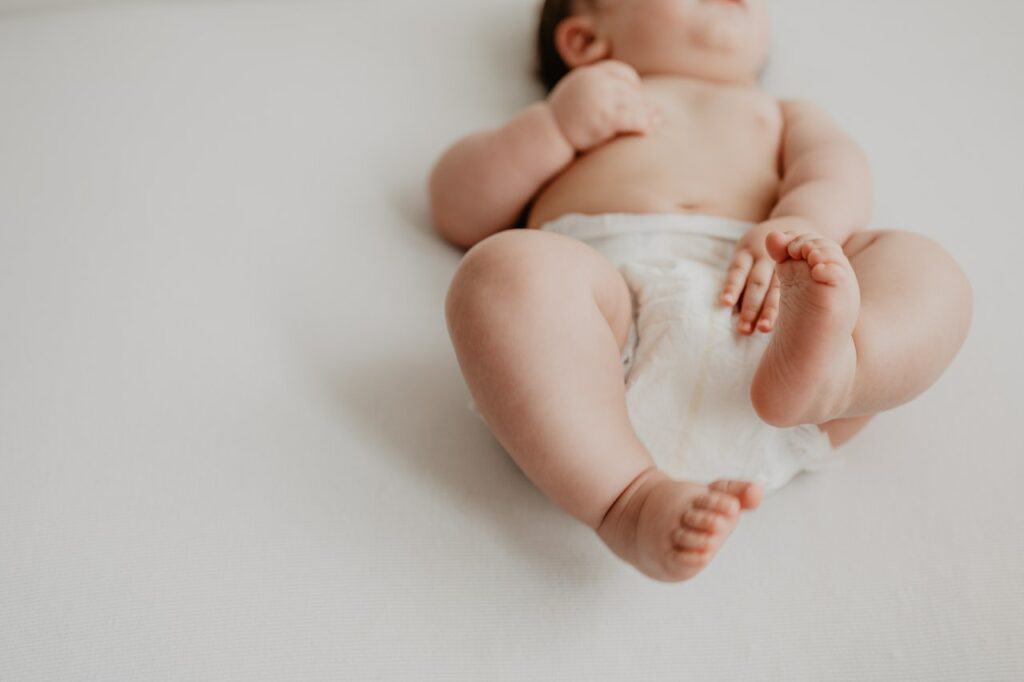
- Breastfeeding: Breast milk is the ideal food for babies, and it can help to regulate their digestive system. Breastfed babies tend to have less smelly poop because breast milk is easier to digest than formula. However, if a breastfeeding mother eats certain foods, such as dairy products, eggs, or nuts, it can cause their baby’s poop to smell more.
- Formula: Formula-fed babies tend to have smellier poop than breastfed babies. This is because formula takes longer to digest and can cause more gas. Some formulas contain probiotics, which can help to regulate a baby’s digestive system and reduce the smell of their poop.
- Solid foods: When a baby starts eating solid foods, their poop will start to smell more. This is because solid foods take longer to digest and can cause more gas. Certain solid foods, such as dairy products, can cause a baby’s poop to smell more.
- Change in diet: If a baby’s diet changes, it can cause their poop to smell different. For example, if a baby starts eating more dairy products, their poop may start to smell more like cheese. If a baby starts eating more fruits and vegetables, their poop may start to smell more like those foods.
Overall, the smell of a baby’s poop is a normal part of their digestive process. However, if a baby’s poop smells extremely foul or is accompanied by other symptoms, such as diarrhea or vomiting, it may be a sign of a more serious problem and should be evaluated by a healthcare provider.
Breastfed vs Formula-Fed Baby Poop
Breastfed baby poop and formula-fed baby poop can look and smell different due to the differences in the nutrients they receive. Here are some key differences between the two:
Breastfed Baby Poop
Breastfed baby poop is usually yellow or green in color and has a soft, creamy texture. It may also have a slightly sweet or sour smell. This is because breast milk is easier for babies to digest, and breastfed babies tend to have more frequent bowel movements than formula-fed babies.
Breastfed baby poop may also contain small white specks, which are normal and indicate that the baby is digesting milk fat properly. If the poop is frothy or watery, it may indicate that the baby is not getting enough hindmilk, which is the fatty milk that comes out towards the end of a feeding.
Formula-Fed Baby Poop
Formula-fed baby poop is usually tan or yellow in color and has a thicker, paste-like texture. It may also have a stronger odor than breastfed baby poop, which can sometimes smell like rotten eggs or sulfur due to the added iron in formula.
Formula-fed babies tend to have fewer bowel movements than breastfed babies, and their poop may be firmer and more formed. If the poop is hard and pellet-like, it may indicate that the baby is constipated and may need a different type of formula or more water.
Overall, the color and texture of a baby’s poop can vary depending on many factors, including their age, diet, and overall health. If you have concerns about your baby’s poop, it’s always best to consult with a healthcare provider.
Health Conditions Related to Baby Poop Smell
There are several health conditions that can cause a baby’s poop to have a strong vinegar-like smell. Here are some of the possible causes:
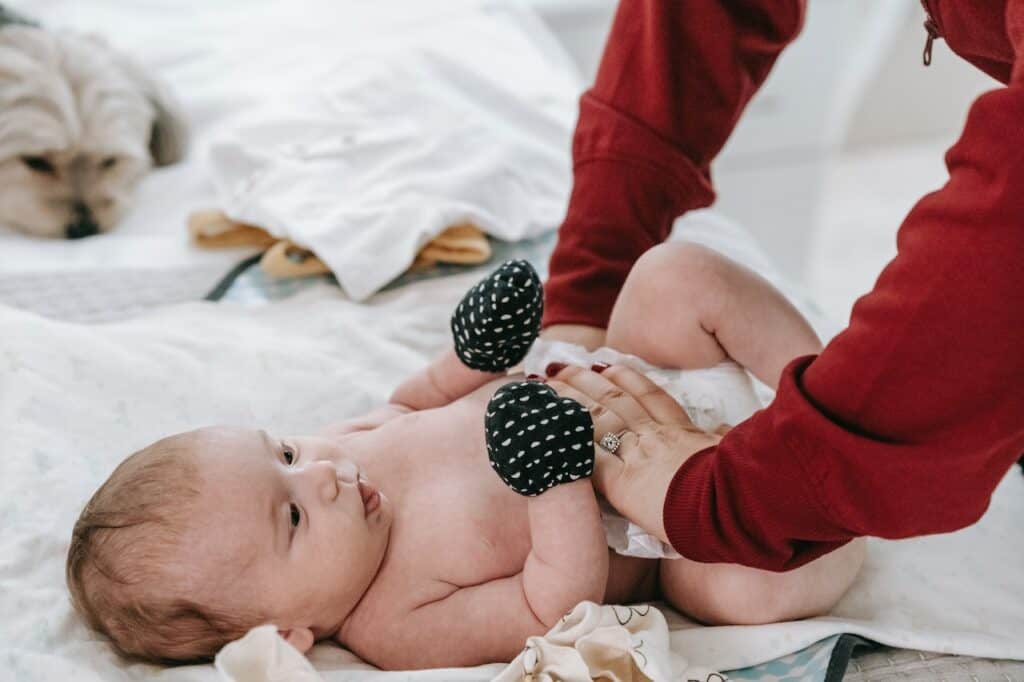
1. Lactose intolerance
Lactose intolerance is a common condition that affects many babies. It occurs when the baby’s body is unable to digest lactose, a sugar found in milk and other dairy products. This can cause the baby’s poop to have a sour smell, similar to vinegar.
2. Food sensitivity
Some babies may be sensitive to certain foods, which can cause their poop to smell sour or vinegary. Common culprits include spicy foods, citrus fruits, and foods that are high in fat.
3. Rotavirus
Rotavirus is a common viral infection that can cause diarrhea in babies and young children. The diarrhea caused by rotavirus can have a strong, sour smell, similar to vinegar.
4. Digestive issues
Babies with digestive issues, such as constipation or diarrhea, may have poop that smells sour or vinegary. This can be caused by a variety of factors, including an imbalance of gut bacteria or a blockage in the digestive system.
5. Celiac disease
Celiac disease is a genetic condition that affects the body’s ability to digest gluten, a protein found in wheat, barley, and rye. Babies with celiac disease may have poop that smells sour or vinegary, as well as other symptoms such as bloating, abdominal pain, and malnutrition.
6. Dehydration
Dehydration can cause a baby’s poop to become more concentrated and smelly. If your baby is not drinking enough fluids, their poop may have a strong, sour smell.
It’s important to note that while a sour or vinegary smell in a baby’s poop can be a sign of a health condition, it can also be completely normal. If you’re concerned about your baby’s poop smell or have any other concerns about their health, it’s always best to consult with a healthcare professional.
Signs and Symptoms to Watch Out For
Parents often worry about their baby’s poop, especially if it smells like vinegar. While it’s normal for a baby’s poop to have a mild smell, a strong vinegar-like odor could be a sign of an underlying health issue. Here are some signs and symptoms to watch out for:
- Diarrhea: Loose, watery stools that occur more frequently than usual could be a sign of diarrhea. If your baby’s poop smells like vinegar and is accompanied by diarrhea, it’s important to monitor their hydration levels and seek medical attention if necessary.
- Blood or mucus: If your baby’s poop contains blood or mucus, it could be a sign of an infection or other health issue. Seek medical attention if you notice these symptoms.
- Foul-smelling poop: While all poop has a certain odor, extremely foul-smelling poop could indicate a problem with your baby’s digestive system. Consult your pediatrician if you notice this symptom.
- Weight loss: If your baby is losing weight or not gaining weight as expected, it could be a sign of a health issue. If this symptom is accompanied by vinegar-smelling poop, seek medical attention.
- Wheezing or shortness of breath: If your baby is experiencing respiratory symptoms such as wheezing or shortness of breath along with vinegar-smelling poop, it could be a sign of a serious health issue. Seek medical attention immediately.
- Skin rashes or hives: If your baby develops a skin rash or hives along with vinegar-smelling poop, it could be a sign of an allergic reaction or other health issue. Seek medical attention if you notice these symptoms.
It’s important to note that not all babies will exhibit symptoms if their poop smells like vinegar. However, if you notice any of the above symptoms, it’s important to seek medical attention to ensure your baby’s health and well-being.
Food Allergies and Sensitivities in Babies
Food allergies and sensitivities can cause a variety of symptoms in babies, including changes in bowel movements and the smell of their poop. Some babies may have a reaction to certain foods, while others may be sensitive to them.
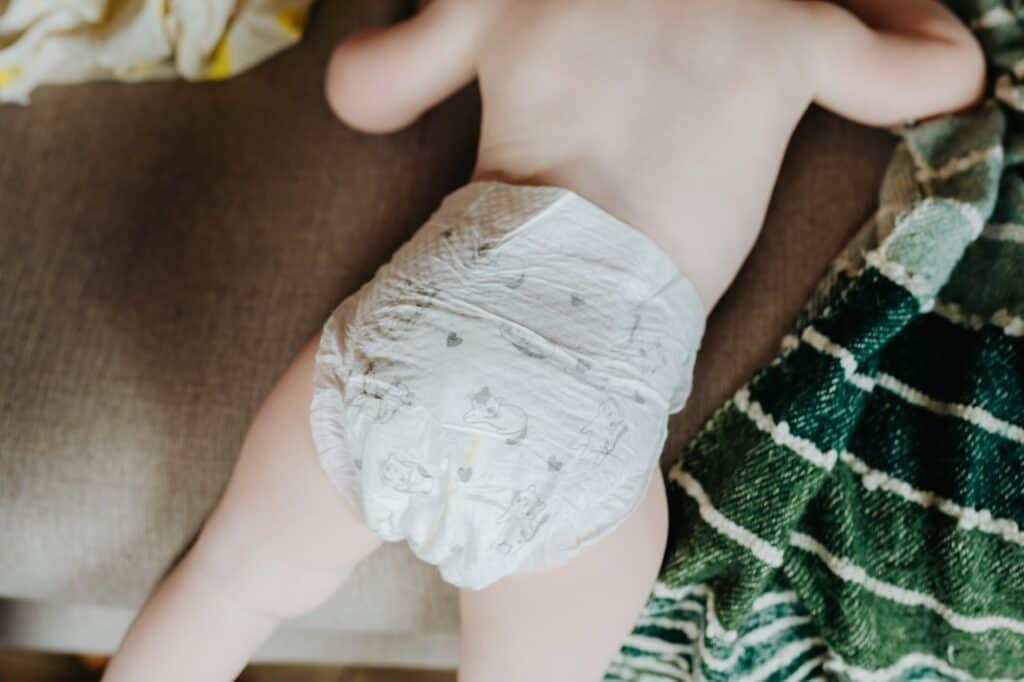
Dairy is a common allergen that can cause changes in the smell of a baby’s poop. Babies who are lactose intolerant or have a milk allergy may experience diarrhea, bloating, and gas. Family history can also play a role in the development of food allergies and sensitivities.
It is important for parents to pay attention to their baby’s reactions to different foods and to talk to their pediatrician if they suspect an allergy or sensitivity. In some cases, a doctor may recommend eliminating certain foods from the baby’s diet to see if symptoms improve.
Parents should also be aware of the signs of a severe allergic reaction, such as difficulty breathing or swelling of the face and throat. If these symptoms occur, seek medical attention immediately.
Overall, it is important to be knowledgeable about food allergies and sensitivities in babies and to work with a pediatrician to ensure the baby is getting the proper nutrition and care.
When to Consult a Doctor
If a baby’s poop smells like vinegar, it may be a sign of an underlying medical condition. While it may not always be a cause for concern, it is important to know when to consult a doctor. Here are some situations where it is recommended to seek medical attention:
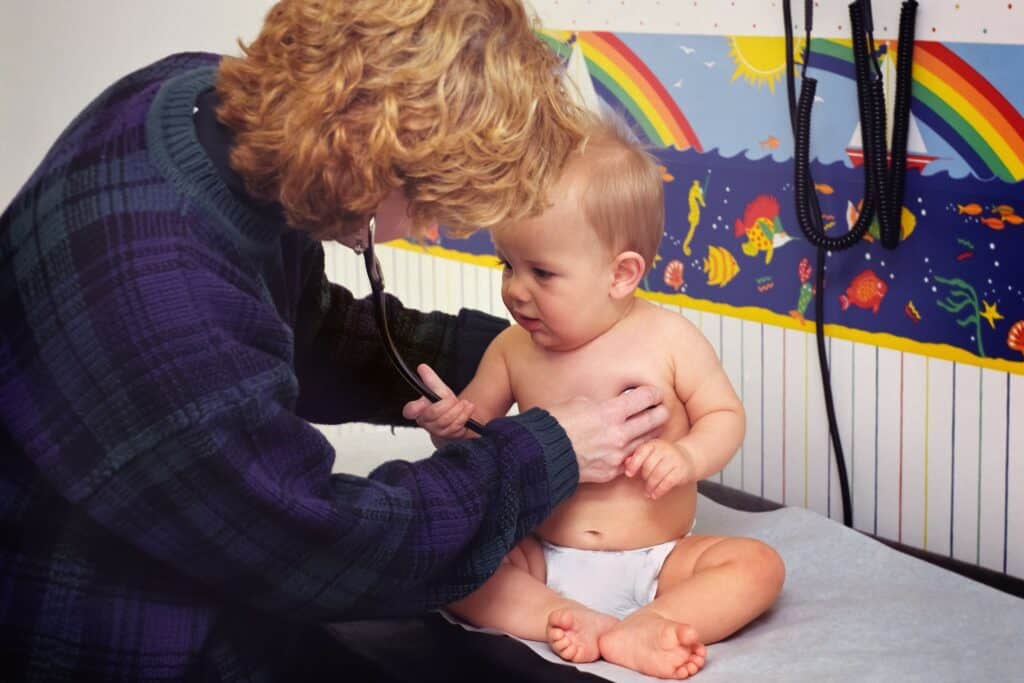
1. Persistent Smell
If the vinegar-like smell persists for more than a few days, it is advisable to consult a doctor. This could be a sign of an infection or digestive issue that requires medical attention.
2. Other Symptoms
If the baby has other symptoms such as diarrhea, vomiting, or a fever, it is important to seek medical attention. These symptoms could be a sign of an underlying medical condition that requires treatment.
3. Feeding Issues
If the baby is having trouble feeding or is not gaining weight, it is important to consult a doctor. This could be a sign of a digestive issue that requires medical attention.
4. Family History
If there is a family history of digestive issues or other medical conditions, it is important to inform the doctor. This could help in identifying any underlying medical conditions that may be causing the vinegar-like smell.
It is important to note that every baby is different, and some may have a vinegar-like smell in their poop without any underlying medical conditions. However, if there are any concerns or doubts, it is always better to consult a doctor or pediatrician for a proper diagnosis and treatment.
Remedies and Treatments
When a baby’s poop smells like vinegar, it can be a cause for concern. However, there are several remedies and treatments available to help alleviate the issue.
1. Remedy
One remedy for a baby’s poop smelling like vinegar is to adjust their diet. If the baby is breastfed, the mother can try eliminating certain foods from her diet that may be causing the issue. If the baby is formula-fed, switching to a different brand of formula may help.
2. Medications
If the issue persists, a doctor may prescribe medication to help treat the underlying cause of the vinegar-smelling poop. For example, if the baby has a bacterial infection, antibiotics may be prescribed.
3. Antibiotics
While antibiotics can be effective in treating bacterial infections, they can also have side effects. It is important to follow the doctor’s instructions carefully when giving antibiotics to a baby.
In conclusion, there are several remedies and treatments available for a baby whose poop smells like vinegar. It is important to consult with a doctor to determine the underlying cause and the best course of action.
Related Posts:
Frequently Asked Questions
What causes a sour smell in a baby’s poop?
A sour smell in a baby’s poop can be caused by a few different things. One common cause is a change in diet, such as introducing solid foods or switching to a new formula. Another possible cause is an infection, such as a gastrointestinal infection or a urinary tract infection.
Is it normal for a baby’s poop to smell like vinegar?
While a sour smell in a baby’s poop is not uncommon, a strong vinegar smell may indicate a problem. It could be a sign of a bacterial infection or an intolerance to certain foods. If the vinegar smell persists or is accompanied by other symptoms, such as diarrhea or fever, it is important to consult a doctor.
Why does my toddler’s poop smell like vinegar?
A vinegar smell in a toddler’s poop could be caused by a similar range of factors as in babies. It could be due to a change in diet, an infection, or an intolerance to certain foods. It is important to monitor the situation and consult a doctor if the smell persists or is accompanied by other symptoms.
What does it mean if my baby’s poop smells like sour milk?
A sour milk smell in a baby’s poop could indicate an intolerance to lactose or a problem with the digestive system. It is important to monitor the situation and consult a doctor if the smell persists or is accompanied by other symptoms, such as diarrhea or vomiting.
Why does my breastfed baby’s poop suddenly smell bad?
A sudden change in the smell of a breastfed baby’s poop could be due to a change in the mother’s diet or an infection. It is important to monitor the situation and consult a doctor if the smell persists or is accompanied by other symptoms.
How can I help my baby’s poop smell better?
To help improve the smell of a baby’s poop, it is important to ensure they are getting a balanced and healthy diet. This may involve introducing new foods gradually and monitoring for any adverse reactions. It is also important to maintain good hygiene practices, such as washing hands and changing diapers frequently.
Related Post: What If My Baby Won’t Burp After Feeding?
https://www.youtube.com/watch?v=gjWY7_odFq8

Iesha is a loving mother of 2 beautiful children. She’s an active parent who enjoys indoor and outdoor adventures with her family. Her mission is to share practical and realistic parenting advice to help the parenting community becoming stronger.
